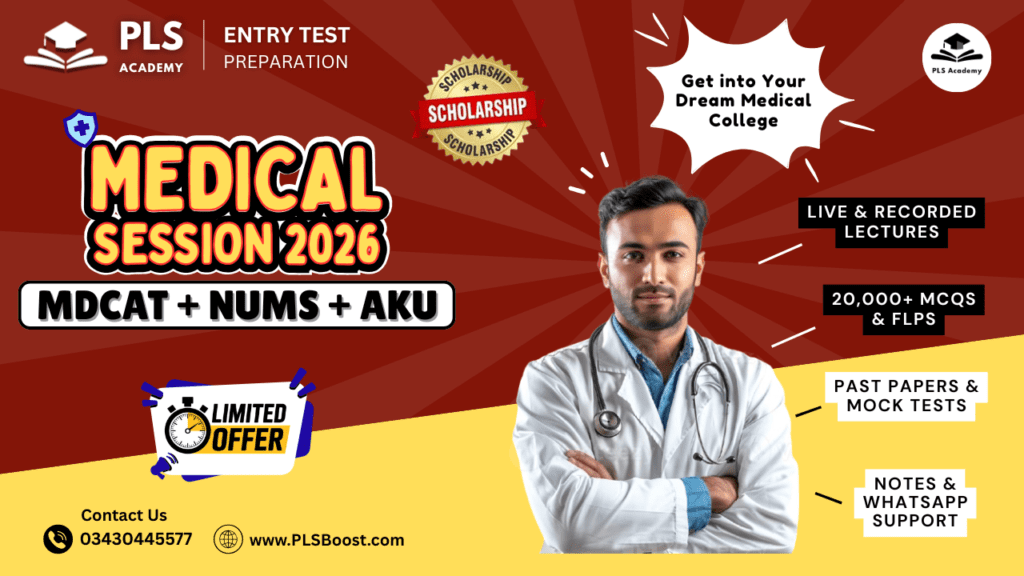Medical Laboratory Technology (MLT) is a healthcare field that focuses on the clinical laboratory work essential for diagnosing, monitoring, and treating diseases. MLTs play a crucial role in providing accurate and timely laboratory test results that help healthcare professionals make informed decisions about patient care. MLT encompasses various aspects, including:
PLS Boost Bundle
Get Access to 20 thousands+ MCQs Including Topical MCQs, Practice Tests, Mock Tests, Solved Past Papers, Flashcards, Notes, FLPS, and Much More.
- Sample Collection: MLTs may be involved in collecting various types of biological samples, such as blood, urine, tissue, and other bodily fluids, from patients for diagnostic testing.
- Laboratory Testing: MLTs perform a wide range of diagnostic tests, including hematological (blood), biochemical (chemical analysis), microbiological (bacterial, viral, and fungal), immunological (immune system), and molecular (genetic) tests. These tests are used to diagnose diseases, monitor patient health, and evaluate the effectiveness of treatments.
- Equipment Operation: MLTs are responsible for operating and maintaining sophisticated laboratory equipment, including analyzers, microscopes, and other specialized instruments used in the diagnostic process.
- Quality Control: Ensuring the accuracy and reliability of laboratory test results is a critical aspect of MLT. MLTs implement quality control measures, calibrate instruments, and verify the accuracy of test results to maintain high standards of precision.
- Data Analysis: MLTs interpret and analyze test results, generating reports for healthcare providers to aid in patient diagnosis and treatment planning.
- Problem-Solving: MLTs troubleshoot issues related to test procedures, instruments, and unexpected results. They may also recommend adjustments or retesting as needed.
- Laboratory Safety: MLTs follow strict safety protocols to protect themselves, co-workers, and patients from exposure to infectious materials, hazardous chemicals, and other potential risks in the laboratory.
- Record Keeping: MLTs maintain detailed records of patient samples, test results, and laboratory procedures to ensure accurate documentation and reporting.
- Continuing Education: Given the dynamic nature of medical technology, MLTs need to stay up-to-date with advances in laboratory techniques and technologies through ongoing education and training.
MLTs work in various healthcare settings, including hospitals, clinical laboratories, research institutions, public health agencies, and private diagnostic companies. They are an integral part of the healthcare team and collaborate with doctors, nurses, and other medical professionals to provide comprehensive patient care. The results produced by MLTs influence clinical decisions and patient outcomes, making them essential contributors to the healthcare system.
Admission
In Pakistan, admission to MLT programs is typically based on an entrance exam such as the MDCAT (Medical and Dental College Admission Test), followed by an interview. The admission criteria may vary by institution.
Scope
MLT doctors have a wide range of career opportunities available to them. They can work in hospitals, clinics, private practices, research institutions, and the government. They can also pursue further studies in medical specializations such as surgery, cardiology, pediatrics, and others.
Jobs
MLT doctors can work in a variety of roles, such as general practitioners, surgeons, anesthesiologists, radiologists, gynecologists, and pediatricians. They can also work in research and academia. Many MLT doctors work in the public sector, while others may work in the private sector.
Salary
The salary for MLT doctors in Pakistan varies depending on their level of experience, specialization, and place of employment. Generally, doctors who work in public hospitals or clinics may earn less than those who work in the private sector. According to the Pakistan Medical and Dental Council (PMDC), the starting salary for an MLT doctor in the public sector may range from Rs. 80,000 to Rs. 120,000, while those in the private sector may earn significantly more.
Overall, an MLT degree can provide a wide range of career opportunities and a good salary. However, it requires a significant amount of hard work and dedication to complete the degree and become a licensed doctor.








